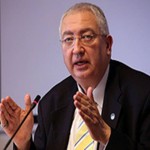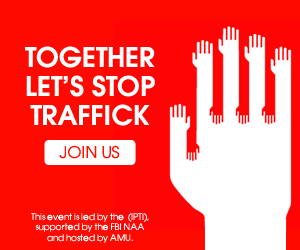By Leischen Stelter, American Military University
The news is often filled with stories of sex trafficking, forced labor, domestic work, forced adoption, and even the illegal trade of human organs. While these are often seen as separate criminal issues, these are all forms of human trafficking and need to be addressed in a coordinated way.
“Human trafficking is a gross violation of human rights and I believe it is the human rights issue of our time,” said Dr. Mohamed Mattar. Dr. Mattar is the executive director of The Protection Project, a human rights institute based at The Johns Hopkins University School of Advanced International Studies in Washington, D.C.

On November 17th, Dr. Mattar will present his research, Human Trafficking in the Middle East: The Scope of the Problem and the Appropriate Responses, during the Together Let’s Stop Traffick summit in Charles Town, W.Va.
“I believe this is a problem that requires intensive efforts, tedious efforts, comprehensive efforts, and cooperative efforts,” he said. “We need countries to come together to pay attention to this problem and we need to form national committees to establish action plans about how to best address this problem.”
One of the primary objectives of the Together Let’s Stop Traffick summit is to build the world’s first fully integrated global resource center to combat human trafficking. This center will help collect and share intelligence from the around the globe, as well as share best practices to help individual countries fight trafficking within their borders.
What are the Challenges to Combating Human Trafficking?
Here are just some of the issues that impede the fight against human trafficking around the globe.
- Improve data and information collection. There is a major deficit of reliable and credible statistics and information about trafficking. Information and data collection about human trafficking is one of the major challenges, said Dr. Mattar. The Protection Project conducts fact-finding missions around the world to collect more data about the prevalence of trafficking. For example, last January, the Protection Project conducted a fact-finding research project in Turkey in an effort to gather more data about the production of goods using child labor. “It is important to have these numbers so we can fully understand the problem and design an appropriate response,” said Dr. Mattar.
- Improve identification of victims. It is extremely difficult to assist victims when you do not know who they are. In many cases, victims of trafficking are often treated by the legal system as criminals. “These people should not be punished, they should be cared for,” Dr. Mattar said. “We must do a better job of identifying these victims.” To do so, law enforcement agencies must be further trained how to identify signs of human trafficking victims.
Related: Tips for Identifying Suspected Victims of Human Trafficking
- Push for legislation around the world. In the U.S., The Victims of Trafficking and Violence Protection Act of 2000 and its amendments in 2003, 2005, 2008, and 2013 have helped expand the criminal liability and victim-protection elements of the law. However, many countries need to establish strict laws against trafficking and work to enforce those laws.
- Prosecute more cases of human trafficking. While many of the laws around human trafficking are relatively new in the U.S, there is often not enough enforcement of these laws. Mattar suggests improved training of prosecutors and judges to make them more aware of human trafficking and the laws around it. There also needs to be better education in other countries to encourage courts to punish human trafficking violations.
- Address corruption. Unfortunately, in many parts of the world, there are cases of public officials looking the other way when it comes to human trafficking. For example, there are reports of law enforcement agencies protecting brothels that house trafficked women. There must be better accountability for corrupt officials who allow trafficking to happen.
- Remove jurisdictional issues. Human trafficking happens across borders and it can be difficult to identify what jurisdiction is responsible for prosecuting certain cases. For example, a trafficking crime can happen in more than one country, but the crime must be addressed in the country of origin. “We must take an exterritorial approach, so it doesn’t matter where the act is taking place,” said Mattar. Under the International Criminal Court (ICC) Statute, Article 7, trafficking in persons is defined as a crime against humanity that is subject to universal jurisdiction and may not be subject to a statute of limitations, said Mattar.
At this point in time, Dr. Mattar believes the U.S. public is aware of the problem and is pleased that there is an effort to share best practices and learn from other countries about what is working and how to replicate those strategies around the world.

Comments are closed.